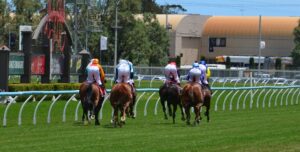 Run over one mile and four furlongs at Longchamp Racecourse in the Bois de Boulogne, west of Paris, traditionally on the first Sunday in October, the Prix de l’Arc Triomphe has the distinction of being the most valuable horse race in Europe. With a prize fund of €5,000,000, of which €2,857,000 goes to the winner, the prestigious race regularly attracts the crème de la crème of middle distance talent from around the world.
Run over one mile and four furlongs at Longchamp Racecourse in the Bois de Boulogne, west of Paris, traditionally on the first Sunday in October, the Prix de l’Arc Triomphe has the distinction of being the most valuable horse race in Europe. With a prize fund of €5,000,000, of which €2,857,000 goes to the winner, the prestigious race regularly attracts the crème de la crème of middle distance talent from around the world.
The jockey who has won the Prix de l’Arc de Triomphe most often is soon to be retired Lanfranco ‘Frankie’ Dettori, who has already announced that he will hang up his boots at the end of the 2023 season, probably on November 4, after the Breeders’ Cup at Santa Anita Park in Arcadia, California. Born in Milan, Italy on December 15, 1970, Dettori was sent to Britain by his father, Gianfranco, in 1985 to become apprenticed to fellow Italian Luca Cumani at Bedford House Stables in Newmarket.
In 1994, Dettori became retained jockey for Goldolphin, the powerful stable founded by Sheikh Mohammed Al Maktoum, Emir of Dubai, and it was for his nephew, Sheikh Saeed Maktoum Al Maktoum, that he first won the Prix de l’Arc de Triomphe on Lammtarra in 1995. Further success in the royal blue silks of his new employer followed on Sakhee in 2001 and Marienbard in 2002, but Dettori would not win the ‘Arc’ again for another 13 years, by which time he had involved in anacrimonious split with Godolphin and served a six-month ban after testing positive for cocaine.
However, with the backing of Newmarket trainer John Gosden, with whom he had enjoyed a successful partnership in the nineties, his career recovered from the doldrums. Dettori has since won the Prix de l’Arc de Triomphe another three times, on Golden Horn in 2015 and Enable in 2017 and 2018; both horses were trained by Gosden.

 The late Joe Mercer will always be best remembered for his association with Brigadier Gerard, who remains the joint third highest rated Flat horse in the history of Timeform. Ridden exclusively by Mercer, ‘The Brigadier’ won 17 of his 18 races between 1970 and 1972, including a famous victory over Mill Reef in the 2,000 Guineas in 1971.
The late Joe Mercer will always be best remembered for his association with Brigadier Gerard, who remains the joint third highest rated Flat horse in the history of Timeform. Ridden exclusively by Mercer, ‘The Brigadier’ won 17 of his 18 races between 1970 and 1972, including a famous victory over Mill Reef in the 2,000 Guineas in 1971. Of course, the most successful horse in the recent history of the Grand National was Tiger Roll, who won back-to-back renewals of the world famous steeplechase in 2018 and 2019, but was denied the chance of a third win by the coronavirus pandemic, in 2020, and by his owner, Michael O’Leary, in 2021 and 2022. Readers of a certain age may also remember – and everyone will almost certainly have heard of – Red Rum, who won the Grand National an unprecedented three times, in 1973, 1974, and 1977.
Of course, the most successful horse in the recent history of the Grand National was Tiger Roll, who won back-to-back renewals of the world famous steeplechase in 2018 and 2019, but was denied the chance of a third win by the coronavirus pandemic, in 2020, and by his owner, Michael O’Leary, in 2021 and 2022. Readers of a certain age may also remember – and everyone will almost certainly have heard of – Red Rum, who won the Grand National an unprecedented three times, in 1973, 1974, and 1977.